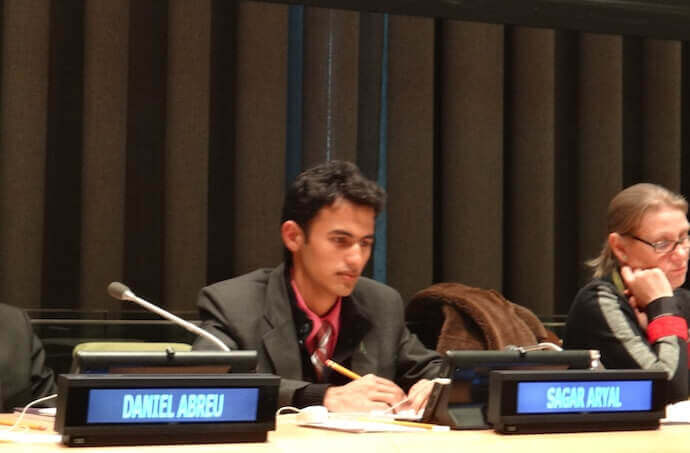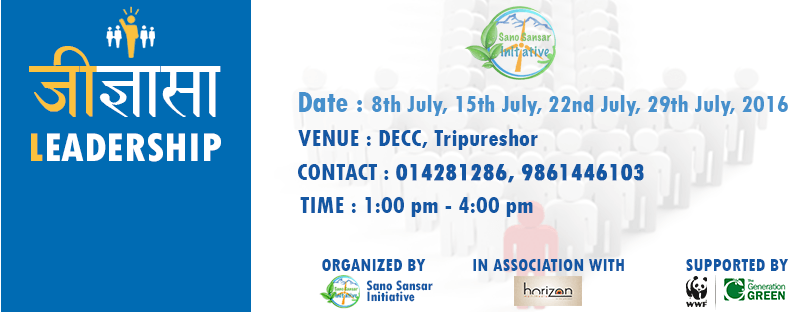After successfully completing Jigyasha: Leadership show, we…

Sustainability begins with education
Creating sustainable and resilient societies is an increasing challenge for countries around the world. To show the important role of education in initiating lasting change beyond 2015, UNESCO, the Government of the Dominican Republic and the Government of the Republic of Mauritius organized a panel discussion on Climate Change Education for Sustainable Development (CCESD) during the 7th meeting of the Open Working Group on Sustainable Development Goals on 10 January in New York.
ìAddressing climate change requires collective action and responsibility of all of the world’s citizens. It requires changing mind-sets and attitudes and rethinking of unsustainable consumption and production patterns. It also requires providing education and training for the youth for green jobsî stressed Vibeke Jensen, Director of the UNESCO New York office in her opening remarks.
ìOur population should be empowered to engage in climate change solutions. Classrooms and the education system, we believe, are the place to foster this changeî, highlighted Daniel Abreu, panellist from the National Council for Climate Change and Clean Development Mechanism, Dominican Republic. The Dominican Republic has trained 400 teachers, reaching out to more than 20,000 pupils in just one year.
Focusing on practical activities that support children in taking on sustainable behaviours and attitudes, the programme has inspired considerable interest among other Latin American countries. ìJust knowing about climate change problems does not solve themî, stressed Abreu, ìwe are pushing for solutionsî. The next target is set: 4,000 additional teachers will be trained by 2015. In 2014, UNESCO will launch a similar programme in Cuba.
An example of a successful public-private partnership was presented by Le Trong Hung, Deputy Director-General of the Department of Science, Technology and Environment, from the Ministry of Education and Training (MOET), Viet Nam. In 2013, the MOET, UNESCO and Samsung joined forces to educate for sustainable development. ìIn Viet Nam, we consider communities as key players for ESDî, stressed Hung. This is why the partnership not only develops eLearning training courses for teachers, but focuses its action on the wider school community. Among other outcomes, this helps communities to develop their own action plan on ESD – five communities in the pilot region have already done so.
Sagar Aryal from the Sano Sansar Initiative, Nepal and former president of Plant-for-the-Planet, highlighted the power of youth action on climate change. ìAt Plant for the Planet, we not only talk about why we need to save the planet. We teach people how to do it. We teach them how to use resources wisely and how to reduce the use of plasticsî. Under the motto ìStop talking, start plantingî, 380 Plant-for-the-Planet academies are active in over 40 countries. Since the start of the initiative in 2007, they planted 12,810,337,277 trees and reached out to 28,000 children worldwide. The vision, stressed Aryal, is to plant a thousand billion trees and to empower 1 million children by 2020.
The Republic of Mauritius made making the island a model of sustainable development a national priority. The Maurice Ile Durable (MID) policy focuses on education as one of five pillars to mainstream sustainable development. In 2012, the island piloted a UNESCO Climate Change Education programme. By 2020, Mauritius wants to achieve 100 per cent MID literacy and be an internationally-recognized hub for sustainable development. Although critical, high-level political support is not the only success factor. ìThe challenge is how to empower people of all ages to be responsible for creating a sustainable future. We believe that the education sector should be the spearhead of society for a sustainable futureî, stressed Osman Mahomed, Executive Chairman of the Commission Maurice Ile Durable.
In a statement read out by the moderator, Shigeharu Kato, Secretary-General of the Japanese National Commission for UNESCO, highlighted the importance of the UNESCO World Conference on ESD to be held in Aichi-Nagoya, Japan in November 2014. ìThe World Conference is more than simply a meeting on education. It provides an important forum for thinking about reorienting education.î He stressed that education is a key element for the post-2015 agenda.
The Global Action Programme on ESD – the follow-up to the UN Decade of ESD (2005-2014) – is expected to be launched at the UNESCO World Conference on ESD in Japan.
Originally posted at: https://fr.unesco.org/node/182975




